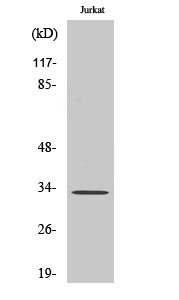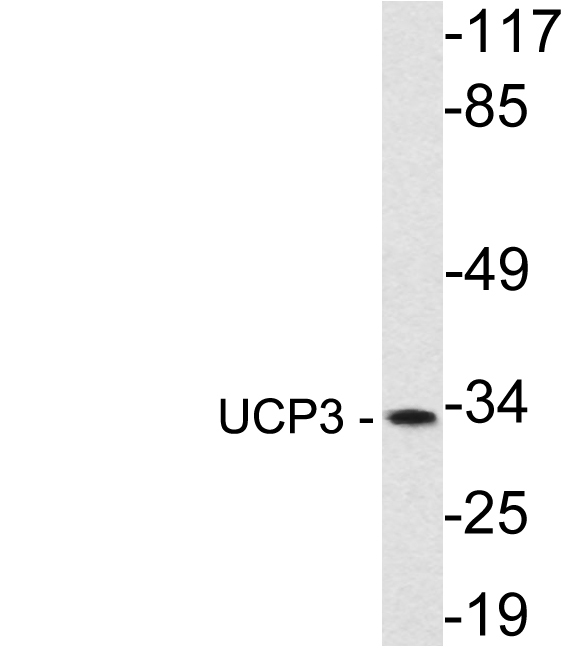UCP3 Polyclonal Antibody
- Catalog No.:YT4814
- Applications:WB;ELISA
- Reactivity:Human;Mouse;Rat
- Target:
- UCP3
- Gene Name:
- UCP3
- Protein Name:
- Mitochondrial uncoupling protein 3
- Human Gene Id:
- 7352
- Human Swiss Prot No:
- P55916
- Mouse Gene Id:
- 22229
- Mouse Swiss Prot No:
- P56501
- Rat Gene Id:
- 25708
- Rat Swiss Prot No:
- P56499
- Immunogen:
- The antiserum was produced against synthesized peptide derived from human UCP3. AA range:259-308
- Specificity:
- UCP3 Polyclonal Antibody detects endogenous levels of UCP3 protein.
- Formulation:
- Liquid in PBS containing 50% glycerol, 0.5% BSA and 0.02% sodium azide.
- Source:
- Polyclonal, Rabbit,IgG
- Dilution:
- WB 1:500 - 1:2000. ELISA: 1:10000. Not yet tested in other applications.
- Purification:
- The antibody was affinity-purified from rabbit antiserum by affinity-chromatography using epitope-specific immunogen.
- Concentration:
- 1 mg/ml
- Storage Stability:
- -15°C to -25°C/1 year(Do not lower than -25°C)
- Other Name:
- UCP3;SLC25A9;Mitochondrial uncoupling protein 3;UCP 3;Solute carrier family 25 member 9
- Observed Band(KD):
- 33kD
- Background:
- Mitochondrial uncoupling proteins (UCP) are members of the larger family of mitochondrial anion carrier proteins (MACP). UCPs separate oxidative phosphorylation from ATP synthesis with energy dissipated as heat, also referred to as the mitochondrial proton leak. UCPs facilitate the transfer of anions from the inner to the outer mitochondrial membrane and the return transfer of protons from the outer to the inner mitochondrial membrane. They also reduce the mitochondrial membrane potential in mammalian cells. The different UCPs have tissue-specific expression; this gene is primarily expressed in skeletal muscle. This gene's protein product is postulated to protect mitochondria against lipid-induced oxidative stress. Expression levels of this gene increase when fatty acid supplies to mitochondria exceed their oxidation capacity and the protein enables the export of fatty acids from mitochondria.
- Function:
- disease:Defects in UCP3 may be involved in severe obesity [MIM:601665].,function:UCP are mitochondrial transporter proteins that create proton leaks across the inner mitochondrial membrane, thus uncoupling oxidative phosphorylation. As a result, energy is dissipated in the form of heat. May play a role in the modulation of tissue respiratory control. Participates in thermogenesis and energy balance.,similarity:Belongs to the mitochondrial carrier family.,similarity:Contains 3 Solcar repeats.,tissue specificity:Only in skeletal muscle and heart. Is more expressed in glycolytic than in oxidative skeletal muscles.,
- Subcellular Location:
- Mitochondrion inner membrane ; Multi-pass membrane protein .
- Expression:
- Only in skeletal muscle and heart. Is more expressed in glycolytic than in oxidative skeletal muscles.
- June 19-2018
- WESTERN IMMUNOBLOTTING PROTOCOL
- June 19-2018
- IMMUNOHISTOCHEMISTRY-PARAFFIN PROTOCOL
- June 19-2018
- IMMUNOFLUORESCENCE PROTOCOL
- September 08-2020
- FLOW-CYTOMEYRT-PROTOCOL
- May 20-2022
- Cell-Based ELISA│解您多样本WB检测之困扰
- July 13-2018
- CELL-BASED-ELISA-PROTOCOL-FOR-ACETYL-PROTEIN
- July 13-2018
- CELL-BASED-ELISA-PROTOCOL-FOR-PHOSPHO-PROTEIN
- July 13-2018
- Antibody-FAQs
- Products Images

- Western Blot analysis of various cells using UCP3 Polyclonal Antibody diluted at 1:1000. Secondary antibody(catalog#:RS0002) was diluted at 1:20000

- Western blot analysis of lysate from Jurkat cells, using UCP3 antibody.



